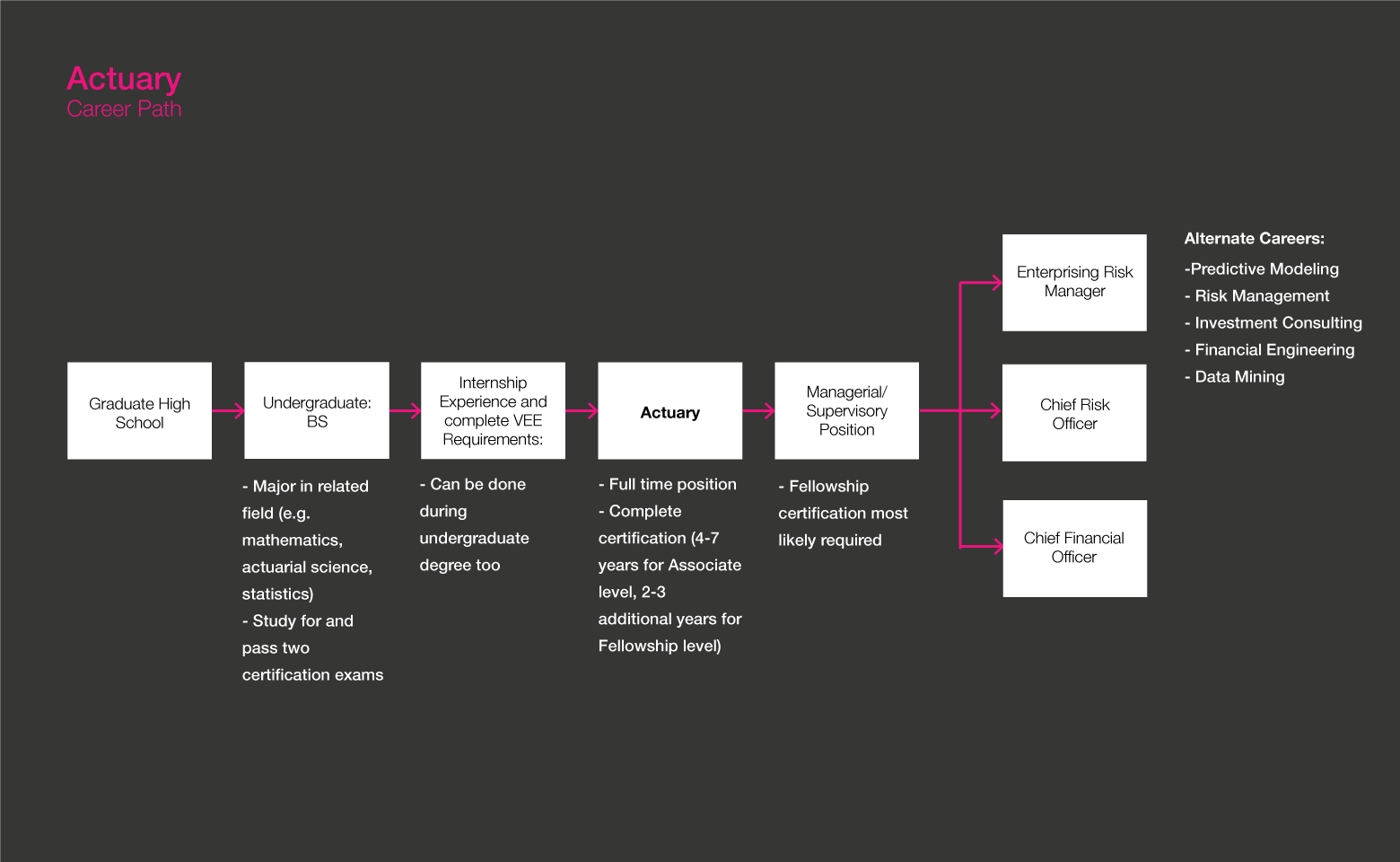Spotlights
Actuarial Analyst, Actuarial Associate, Actuarial Consultant, Actuary, Consulting Actuary, Health Actuary, Pricing Actuary, Pricing Analyst, Product Development Actuary, Retirement Actuary
Actuaries use statistical and financial analysis to assess the costs associated with risk and uncertainty. They may also work with clients to mitigate these costs through specially designed policies, and/or develop predictive tables to assess the potential of risk-associated costs in the future.
- Positive employment outlook
- Good job security
- Opportunity for professional growth and advancement
- Intellectual challenge and engagement with mathematics
- Data work: accumulate statistical data and other resources for analysis
- Analytical work:
- Assess/predict the economic cost of foreseeable events (e.g. sickness, accident, etc.)
- Plan and implement policies and business strategies to reduce costs, minimize risk, and maximize profits
- Formally present assessments and proposals with visual aids, and graphic representation of statistical calculations (e.g. charts, tables, etc.)
- Computer-work: most of an actuary’s tasks are completed on a computer, primarily with database and modeling software
- Teamwork: actuaries usually work in collaboration with other professionals from relevant fields such as accountants, financial analysts, and market research analysts
Soft Skills
- Analytical skills
- Problem-solving skills
- Communication and Interpersonal skills
Technical Skills
- Mathematics
- Microsoft Access
- Microsoft Excel
- Data managing: SQL
- Programming languages: VBA and C++
- Insurance companies (different fields, e.g. health insurance actuaries, life insurance actuaries, property and casualty insurance actuaries, pension and retirement benefits, enterprise risk actuaries)
- Private corporations
- Consulting agencies(e.g. auditing the work of actuaries at other companies or performing actuarial tasks for a company that does not have an employed actuary)
- Government agencies (e.g. evaluating/predicting the effects of changes to social security and other government benefits)
- Colleges and Universities
- Banks and investment firms
- Rigorous, time-consuming examination and certification process
- General rule: each actuarial exam requires about 150 hours of studying/hour of the exam
- That said, most actuarial employers support actuaries pursuing certification by covering exam fees and textbooks, and/or providing paid leave for study weeks
- May work longer hours as a trainee
- Experts believe calculating tasks will shift from being conducted through Excel, to the cloud
- Cost–cutting is an increasingly expected function of actuaries
- Enjoyed math class
- Interest in business studies/concepts/news
- Participated in business competitions (e.g. DECA)
Basic Requirements
- Bachelor’s degree in an analytical field (e.g. mathematics, actuarial science, statistics),
- Expect to study topics such as economics, applied statistics, and corporate finance, as well as perhaps computer science/programming languages, and how to use databases and spreadsheets
- Actuaries should learn how to use Excel, VBA, and possibly SQL, SAS, R, Python, Tableau, or Power BI
Requirements for Certification
- Actuaries have to be certified, a process that first requires training with mentor actuaries
In training, you’ll learn how to compile data, do research, and write reports. You may be assigned to other sections to learn about marketing, underwriting, and product development, too - Many Actuaries-in-Training do internships in their desired area of specialization, such as health, life, pension, and casualty
- The Casualty Actuarial Society and Society of Actuaries provide associate and fellow certification requiring exams and seminars. These certifications can take years on their own (up to 7 just to reach the associate level!)
- Some employers only hire candidates who’ve completed a certification, or they might help new hires by offering paid study time and bonuses for passing exams
- After certification, workers must maintain their certs via continuing education
- Note, Pension Actuaries may require both Department of Labor and Department of the Treasury Joint Board for the Enrollment of Actuaries licensure
*Each association specializes in specific fields in which an actuary may operate
- Certification requires completing a VEE requirement (validation by educational experience) consisting of coursework in economics, finance, and statistics as well as passing a series of exams and attending seminars
- Many employers seek trainee actuaries who have already passed one or two exams before completing their undergraduate education
- Associate certification is usually achieved in 4 to 7 years, and an additional 2 to 3 years are necessary for fellowship certification
Requirements for Career Advancement
- Job performance and attainment of certification
- Developing skills through professional workshops, conferences, and additional computer, writing, software courses
- Fellowship certification allows an actuary to attain supervisory/managerial positions
Click here for the top programs.
- Enroll in plenty of math, accounting, finance, statistics, analytics, economics, and computer programming language courses
- Don’t forget to hone your verbal, written, and presentation skills!
- If your school doesn’t offer courses in Excel, VBA, SQL, SAS, R, or Python, consider self-study or standalone, online short courses
- Volunteer as a budget officer with school clubs or other organizations
- If pursuing your college degree, apply for Actuarial intern jobs to gain work experience and potentially qualify for future full-time employment
- Talk to working Actuaries to ask which skills to focus on developing and advice on getting hired
- Craft a compelling LinkedIn profile and stay connected with people in your network

- Actuarial internships are a great place to start on your path to becoming an Actuary
- Consider seeking out employers who will let you study for certification and licensure while working and getting paid
- Use job portals like eFinancialCareers, Financial Job Bank, CAS, SOA, Indeed, Simply Hired, Glassdoor, and the Association for Financial Professionals’ job board to find opportunities
- Expect to start in junior positions such as Actuary Associate, Analyst, or Student
- Search for keywords in job ads and include them in your resume to help it get past automated tracking software
- Be honest and upfront about your qualifications and background. Focus on job skills and experiences that relate to the job you’re applying for
- Add hard data on your resume while also showing how you made a difference
- Check out Actuary resume examples online to get ideas for your own
- Have someone else review and edit your resume and any other application materials for accuracy and clarity
- Alert your network that you're seeking Actuary positions. Let former teachers, supervisors, and co-workers know in advance if you want them to be on your references list
- Study interview questions so you can think about how you’ll answer during interviews
-
Stellar work ethic, self-motivation, and perseverance to conduct hours and hours of independent study
-
Advanced skills in organization and communication to analyze risk and advise clients appropriately
Websites
- American Academy of Actuaries
- American Society of Pension Professionals and Actuaries
- Be an Actuary
- Casualty Actuarial Society
- CFA Institute
- Conference of Consulting Actuaries
- LOMA
- National Academy of Social Insurance
- Society of Actuaries
- https://actuarialstudentblog.wordpress.com/
- https://www.actuaryonfire.com/
- http://www.thetravelingactuary.com/actuarial-blog
- YouTube Channel: EllelleActuary https://www.youtube.com/channel/UCvN_MUDrIFJOQAVT1UhkPEw
- http://www.beanactuary.org/?language=english
- http://www.actuarialoutpost.com/about (social networking site for actuaries)
Professional Associations
- CAS: http://www.casact.org/
- SOA: https://www.soa.org/member/
Books
- Predictive Modeling
- Risk Management
- Investment Consulting
- Financial Engineering
- Data Mining
Newsfeed

Featured Jobs

Online Courses and Tools








